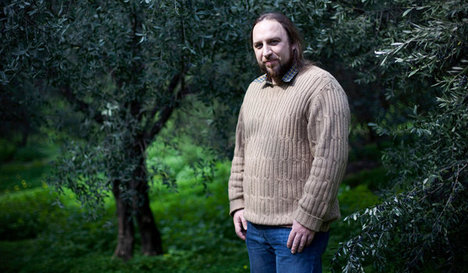 “Fotis Antonopoulos’s struggles to start OliveShop.com have made him a reluctant emblem of thwarted Greek entrepreneurship.” Source of caption and photo: online version of the NYT article quoted and cited below.
“Fotis Antonopoulos’s struggles to start OliveShop.com have made him a reluctant emblem of thwarted Greek entrepreneurship.” Source of caption and photo: online version of the NYT article quoted and cited below.
Vassilis Korkidis, who is quoted below, is (p. A3) “the president of the National Confederation of Hellenic Commerce, a trade association in Athens.”
(p. A1) ATHENS — It was about a year ago that Fotis I. Antonopoulos, a successful Web program designer here, decided he wanted to open an e-business selling olive products.
Luckily, he already had a day job.
It took him 10 months — crisscrossing the city to collect dozens of forms and stamps of approval, including proof that he was up to date on his pension contributions — before he could get started. But even that was not enough. In perhaps the strangest twist of all, his board members were required by the Health Department to submit lung X-rays — and stool samples — since this was a food company.
. . .
With Greece’s economy entering its fourth year of recession, its entrepreneurs are eager to reverse a frightening tide. Last year, at least 68,000 small and medium-size businesses closed in Greece; nearly 135,000 jobs associated with them vanished. Predictions for 2012 are also bleak.
But despite the government’s repeated promises to improve things, the climate for doing business here remains abysmal. In a recent report titled “Greece 10 Years Ahead,” McKinsey & Company described Greece’s economy as “chronically suffering from unfavorable conditions for business.” Start-ups faced immense amounts of red tape, complex administrative and tax systems and procedural disincentives, it said.
. . .
(p. A3) Part of Mr. Antonopoulos’s problem, Mr. Korkidis ventured, was his unwillingness to pay what is routinely referred to here as the “speed tax” — bribes to move things along.
Nor is Mr. Korkidis much of a fan of recent government efforts to improve things. He pointed to a pamphlet produced by the Ministry of Development, which explained a new “one-stop shop” program for new businesses.
“This doesn’t work,” he said. “You have to collect 10 papers first — and then it is one-stop shopping. Ridiculous.”
At 36, Mr. Antonopoulos is an aging computer whiz kid with long hair and an easy smile.
. . .
The worst moment, he said, was when representatives from two agencies came to inspect the shop and disagreed about the legality of a circular staircase. They walked out telling him that he “would have to figure it out.”
“At that point, we actually thought about just going to the U.K. with this,” he said. “One of the inspectors knew about new legislation. The other didn’t. And they just refused to come up with a solution.”
At one point, the company got a huge order from Denmark, he said. But the paperwork for what amounted to a wholesale transaction was so onerous that they decided not to even try to fill the order.
For the full story, see:
SUZANNE DALEY. “A Tale of Greek Enterprise and Olive Oil, Smothered in Red Tape.” The New York Times (Mon., March 19, 2012): A1 & A3.
(Note: ellipses added.)
(Note: the online version of the story has the date March 18, 2012.)
 “In this April 22, 2000 file photo, Elian Gonzalez is held in a closet by Donato Dalrymple, one of the two men who rescued the boy from the ocean, right, as government officials search the home of Lazaro Gonzalez, early Saturday morning, April 22, 2000, in Miami. Armed federal agents seized Elian Gonzalez from the home of his Miami relatives before dawn Saturday, firing tear gas into an angry crowd as they left the scene with the weeping 6-year-old boy.” Source of caption and photo: online version of JENNIFER KAY and MATT SEDENSKY. “10 years later, few stirred by Elian Gonzalez saga.” Omaha World-Herald (Thurs., April 22, 2010): 7A. (Note: the online version of the article is dated April 21, 2010 and has the title “10 years after Elian, US players mum or moving on.”)
“In this April 22, 2000 file photo, Elian Gonzalez is held in a closet by Donato Dalrymple, one of the two men who rescued the boy from the ocean, right, as government officials search the home of Lazaro Gonzalez, early Saturday morning, April 22, 2000, in Miami. Armed federal agents seized Elian Gonzalez from the home of his Miami relatives before dawn Saturday, firing tear gas into an angry crowd as they left the scene with the weeping 6-year-old boy.” Source of caption and photo: online version of JENNIFER KAY and MATT SEDENSKY. “10 years later, few stirred by Elian Gonzalez saga.” Omaha World-Herald (Thurs., April 22, 2010): 7A. (Note: the online version of the article is dated April 21, 2010 and has the title “10 years after Elian, US players mum or moving on.”)



